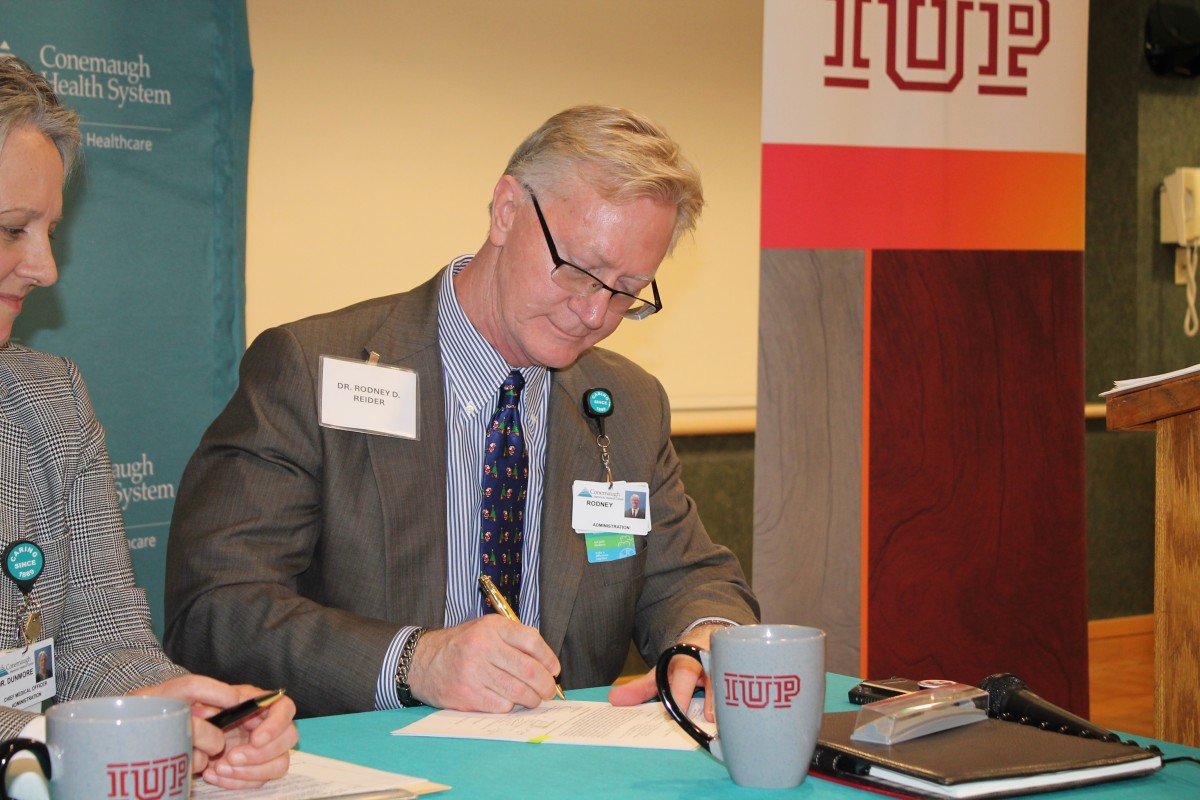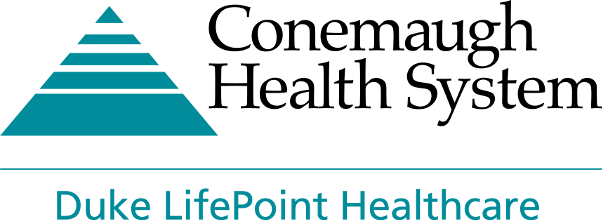Conemaugh Memorial Medical Center signs affiliation agreement with IUP proposed college of osteopathic medicine
December 4, 2024

Conemaugh Memorial Medical Center and IUP formalized a clinical training affiliation agreement for students at Indiana University of Pennsylvania’s proposed college of osteopathic medicine.
IUP’s Council of Trustees endorsed the exploration of a possible development of a college of osteopathic medicine at IUP in December 2022. IUP has formally initiated steps towards accreditation of its proposed college of osteopathic medicine from the American Osteopathic Association’s Commission on Osteopathic College Accreditation, a three- to five-year process that includes submission of self-studies and a feasibility study, along with site visits.
Dr. Miko Rose was hired as the founding dean of the proposed college of osteopathic medicine in November 2023; the hiring of a founding dean is one of the first steps to establishing the college.
Securing clinical training sites for students is part of the successful accreditation process. Typically, students in colleges of osteopathic medicine spend the first two years of their education in the classroom; during the third and fourth years, students are based in the community at clinical sites.
The signing ceremony took place at Conemaugh Memorial Medical Center with IUP President Dr. Michael Driscoll; Dr. Rose; Conemaugh Memorial Medical Center President and CEO Dr. Rodney Reider and Conemaugh Memorial Medical Center Chief Medical Officer, Dr. Elizabeth Dunmore. Remarks were also offered by Conemaugh Memorial Medical Center Emergency Medicine Physician and Program Director of Mentoring in Medicine Dr. Alexander Pozun and State Senator Wayne Langerholc Jr.
‘Today marks another significant step forward, not just for IUP’s proposed college of osteopathic medicine, but for our entire region,” IUP President Dr. Michael Driscoll said.
“Together with great partners, like Conemaugh Memorial Medical Center, we’re making progress toward something truly transformative — a shared commitment to helping improve the health of the residents of Pennsylvania in its rural areas. At the heart of our mission is a simple yet powerful idea: we must work together to improve rural health in Pennsylvania. This is not a task any one organization can accomplish alone. It requires collaboration, vision, and a steadfast commitment to the communities we serve. This ceremony is a tangible representation of that shared vision and our unified determination to address the shortage of medical professionals in rural areas,” he said.
“This partnership with IUP’s proposed college of osteopathic medicine reflects our shared commitment to strengthening healthcare in rural Pennsylvania,” Market President and CEO of Conemaugh Memorial Medical Center Dr. Rodney Reider said.
“By providing future physicians with hands-on training opportunities, we are investing in their education and the long-term health and vitality of the communities we serve. Together, we are laying the foundation for a healthier community and a healthier tomorrow,” Reider said.
“Our collaboration with IUP’s proposed college of osteopathic medicine ensures that students will gain invaluable, real-world experience in a comprehensive clinical environment,” said Dr. Elizabeth Dunmore, Chief Medical Officer. “As the only Level 1 Trauma Center between Pittsburgh and Hershey, Conemaugh Memorial Medical Center offers access to diverse patient cases and advanced medical practices, fostering the development of skilled, compassionate physicians who are well-prepared to meet the challenges of modern medicine.”
IUP signed its first clinical training affiliation agreement with Punxsutawney Area Hospital in June; its second clinical training affiliation agreement with IRMC in September; and agreements with four health providers at the third annual IUP-Indiana Regional Medical Center’s Third Annual Pennsylvania Mountains Rural Health Conference in November: Broad Top Area Medical Center, Hyndman Area Health Centers, Nulton Diagnostics and Treatment Center, and The Primary Health Network.
“Conemaugh Memorial Medical Center has a history of resilience and focus on serving its community, from the time of the Johnstown flood and through periods of scarcity and crisis,” Founding Dean Dr. Rose said. “This medical center is a beacon of light on the hill—a place of hope and healing, which matches IUP’s proposed college of osteopathic medicine’s commitment to rural health and wellness. In addition, its role as a level one trauma center offers a full spectrum pathway for our students,” she said.
“Conemaugh also shares our commitment to vulnerable, underserved regions with an emphasis on full-spectrum healthcare services for the community, a mission we want our students to know and understand, so that we train talented and caring physicians who want to stay and serve communities, including Johnstown, upon graduation,” Dr. Rose said.
IUP’s proposed college of osteopathic medicine team includes Dr. Ryan Smith, founding associate dean of clinical affairs, who is responsible for overseeing the clinical curricular areas of the Doctor of Osteopathic Medicine program, including developing clinical training agreements; and Dr. Luke H. Mortensen, associate dean of preclinical affairs, who is responsible for overseeing the pre-clinical curricular areas of the program.
IUP chose to explore a proposed college of osteopathic medicine based on several factors, including the critical need for rural health care: there are not enough trained physicians to provide care to Pennsylvania’s citizens. According to the United Health Foundation, the ratio of patients to available primary care physicians is 1,367 to 1.
There are only three colleges of osteopathic medicine in Pennsylvania, all at private universities; IUP’s proposed college of osteopathic medicine would be the only college of osteopathic medicine at a public university. National studies show that graduates from osteopathic medicine programs are more likely to pursue primary care in rural and underserved areas—57 percent of all doctors of osteopathic medicine practice as general practitioners, and more than 20 percent of DO graduates practice in rural areas. Demand is high for osteopathic medicine training: in 2021, 22,708 applicants competed for 8,280 seats at schools of osteopathic medicine.
